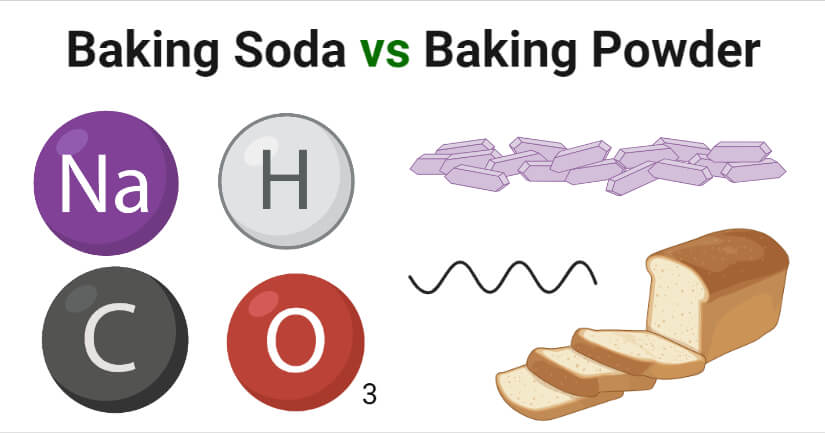Baking Soda Definition
Baking soda is a chemical substance that is a salt composed of sodium and bicarbonate ions, primarily used as a leavening agent in baking.
- The chemical name of the substance is sodium bicarbonate or sodium hydrogen carbonate with the chemical formula, NaHCO3.
- Baking soda is a solid white crystalline compound that exists as a fine powder. It is an odorless compound that is slightly salty in taste.
- Baking soda is a simple chemical compound that is composed of a single compound and doesn’t have other substances.
- It doesn’t have any acidifying or drying agents and is involved in the expansion of the batter resulting in the characteristic spongy texture in cakes and bread.
- The sodium bicarbonate undergoes thermal decomposition to release sodium carbonate, water, and carbon dioxide.
- Baking soda has weak disinfectant properties and is also used as an effective fungicide against some microorganisms.

Baking Powder Definition
Baking powder is a chemical substance composed of a mixture of carbonate or bicarbonate and a weak acid.
- The reaction between the acid and base present in the mixture is prevented by the addition of a buffer in the form of cornstarch.
- The cornstarch also works as a drying agent, whereas the cream of tartar works as an acidifying agent. Other compounds like monocalcium phosphate and sodium aluminum sulfate can also be used as the acidifying agent.
- Baking powder is also used in baking to increase the volume and lighten the texture of baked goods.
- Baking powder can also be used in the place of yeast, where the flavor of fermentation is undesirable.
- Baking powder also releases carbon dioxide at a faster rate through the acid-base reaction than through fermentation.
- Therefore, the production of baking powder has been revolutionary in minimizing the time and labor required for the production of baking goods.
10 Major Differences (Baking Soda vs Baking Powder)
| Characteristics | Baking Soda | Baking Powder |
| Definition | Baking soda is a chemical substance that is a salt composed of sodium and bicarbonate ions, primarily used as a leavening agent in baking. | Baking powder is a chemical substance composed of a mixture of carbonate or bicarbonate and a weak acid. |
| Composition | Baking soda is a pure substance composed of sodium bicarbonate. | Baking powder is a mixture of chemical substances like sodium bicarbonate, cream of tartar, and cornstarch. |
| Acidifying agent | Baking soda doesn’t have any acidifying agents. | Baking powder contains an acidifying agent, which can be cream of tartar or a mixture of monocalcium phosphate and sodium aluminum sulfate. |
| Drying agent | Baking soda doesn’t have any drying agent. | Baking powder contains cornstarch as a drying agent. |
| In baking | During baking, the product should be baked immediately after the addition of baking soda. | The product can be kept for some time before baking after the addition of baking powder. |
| Baking soda results in the spread of the product during baking. | Baking powder results in the puffing of the product during baking. | |
| Baking Time | Baking soda requires a shorter baking time. | Baking powder requires a longer baking time. |
| Ingredients | Baking soda is used with acidic ingredients like buttermilk and lemon juice. | Baking powder is used with non-acidic ingredients like regular milk and flour. |
| Activated By | Baking soda is activated by heat which causes the thermal decomposition of the compound to release carbon dioxide. | Baking powder is usually activated by liquid, but double-acting baking powder might require heat. |
| Other uses | Baking soda can be used for cleaning or as a neutralizing salt. | Baking powder is strictly used for baking. |
References and Sources
- 4% – https://en.wikipedia.org/wiki/Baking_powder
- 2% – https://anybodycanbake.com/difference-baking-soda-and-baking-powder/
- 1% – https://www.thoughtco.com/what-is-cream-of-tartar-607381
- 1% – https://www.thoughtco.com/baking-soda-chemical-formula-608474
- 1% – https://www.numerade.com/questions/baking-soda-sodium-bicarbonate-undergoes-thermal-decomposition-as-follows-2-mathrmnahco_3s-rightleft/
- 1% – https://www.browneyedbaker.com/baking-soda-vs-baking-powder/
- 1% – https://wikimili.com/en/Sodium_bicarbonate
- 1% – https://urbansurvivalsite.com/20-uses-for-baking-soda/
- 1% – https://sciencetrends.com/examples-of-chemical-compounds-in-science/
- 1% – https://answers.yahoo.com/question/index?qid=20060728100729AAPy5bT

Might want to mention that soda liberates water into the mix
Wouldn’t that be the cause of making the dough wetter so it slumps vs the rise as with powder?